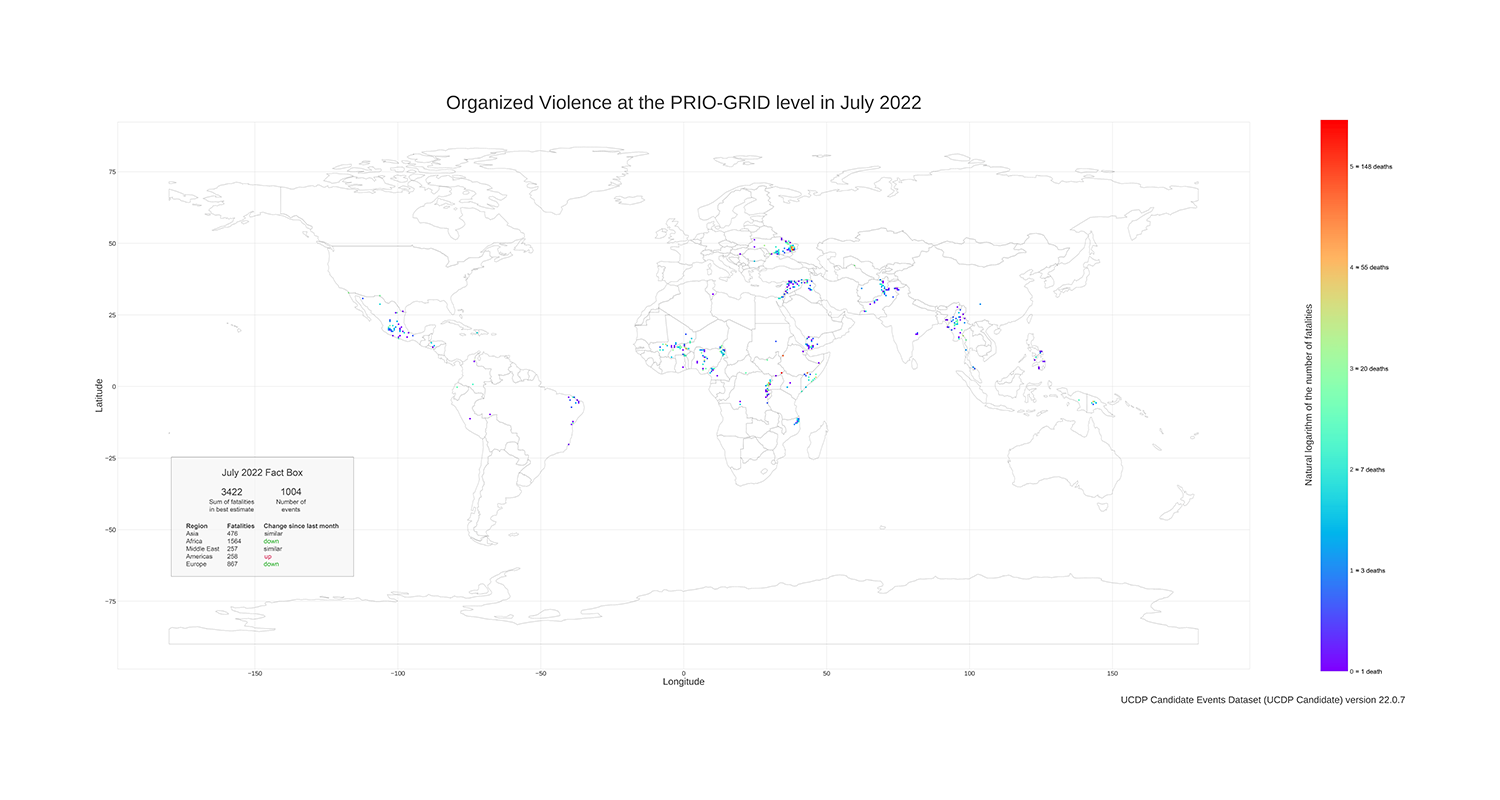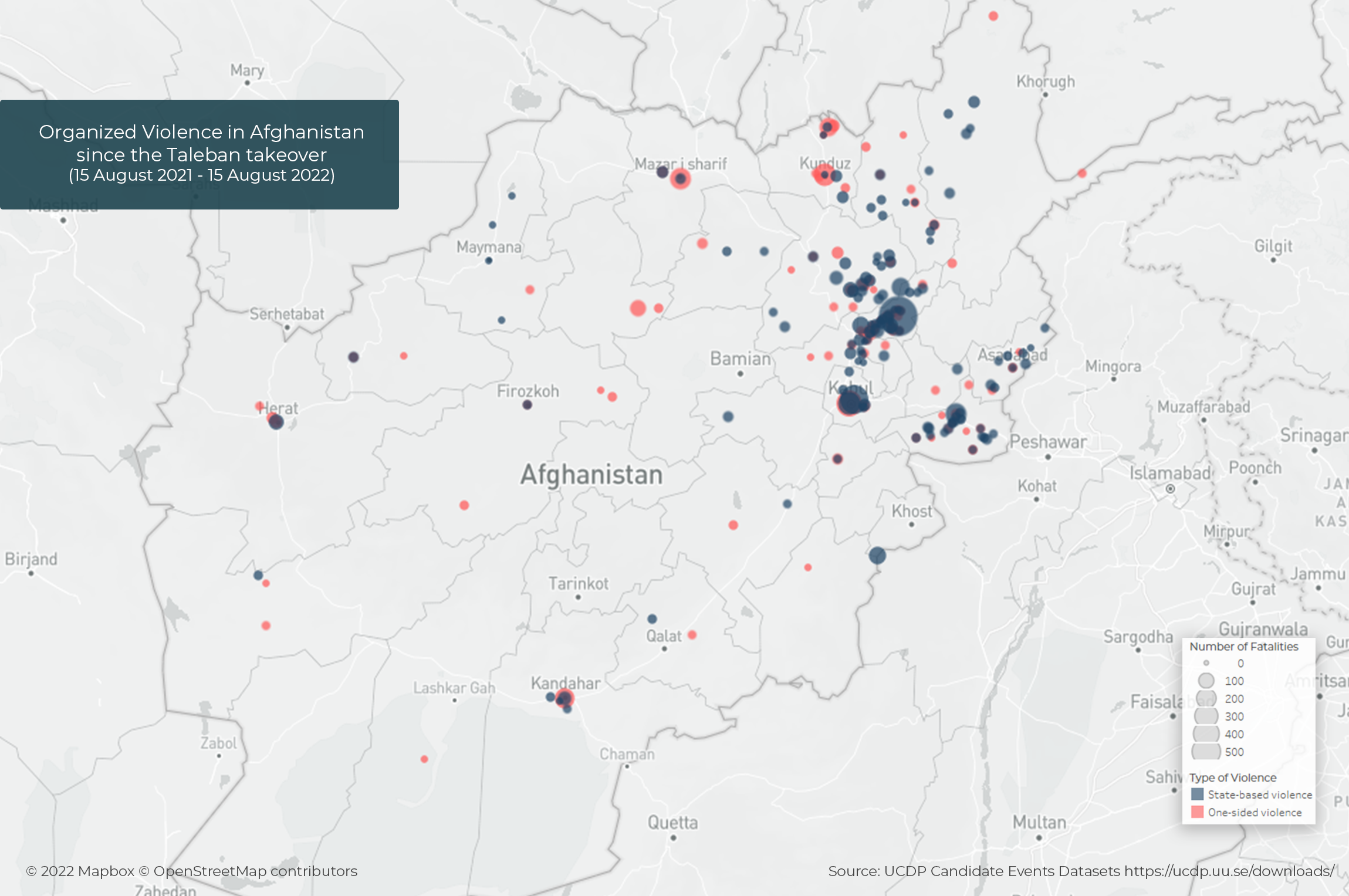|
UCDP Newsletter #6 |
A YEAR UNDER THE TALEBAN |
Organized violence since the takeover in Afghanistan |
Director's Note |
|
Welcome to the Uppsala Conflict Data Program (UCDP) Newsletter!
Afghanistan has been ravaged by international interventions and civil war since the late 1970s. Out of this emerged the Taleban movement which came to power in 1996, imposing strict Islamist rule. The Taleban regime was ousted with the help of a US-led multinational force intervening in 2001, but the Taleban movement continued to fight for twenty years. Between 2018 and 2021, the conflict between the Afghan government and the Taleban was the deadliest intrastate armed conflict in the world.
An agreement between the Taleban and the United States was signed on 29 February 2020, after 18 months of negotiations. Under the agreement, foreign forces would be withdrawn from Afghanistan, and intra-Afghan talks would begin. There was a lull in fighting in 2020 as a result of the peace process and the decrease in air strikes carried out by the US. Nevertheless, as the foreign forces withdrew in 2021, the Taleban consolidated its control over more territory, and on 15 August 2021, Kabul fell to the Taleban. Read more on the developments since the takeover below.
You are always welcome to contact us at ucdp@pcr.uu.se with questions, suggestions, or comments.
Magnus Öberg UCDP Director |
|
Trends in Organized Violence in July 2022 |
|
Mert Can Yilmaz, Uppsala Conflict Data Program |
|
The fighting continued in eastern Ukraine in July 2022, causing at least 650 fatalities.
While the trends in Africa dominated the figures on the fatalities due to armed organized violence, we noted a downward trend in Europe when compared to June 2022. The intensity of organized violence in Asia and the Middle East remained at a similar level, while it increased in Americas.
The five deadliest state-based conflicts in July were Russia - Ukraine , Ukraine: Novorossiya, Somalia: Government, Burkina Faso: Government, and Mali: Government.
Conflicts between unidentified non-state groups in South Sudan dominated non-state violence in July 2022, causing nearly 240 fatalities in a single event. Similarly, the clashes between Hausa and Funj communities in Nigeria were also among the deadliest non-state incidents. Non-state violence in Mexico was also noteworthy during this month.
DR Congo and Nigeria were significantly affected by one-sided violence in July 2022. IS's one-sided attacks in Afghanistan, Burkina Faso, DR Congo, Mali, Mozambique and Syria caused almost 150 fatalities in total during this month. One-sided violence by the government forces in Myanmar was also noteworthy. |
|
Source: UCDP Candidate 22.0.7 |
|
A Year Under The Taleban |
|
Therese Pettersson, Uppsala Conflict Data Program |
|
On 15 August 2021, the Taleban, once again, took the capital of Afghanistan and ousted the government. One year on, the humanitarian and economic situation in the country is dire.
he months leading up to the Taleban takeover marked the most violent months in the history of the conflict, with over 35 000 people killed in battle between January and 15 August. During Taleban rule, conflict violence has decreased substantially. Nonetheless, the Taleban are fighting two insurgencies; one against the Islamic State (IS) and one against the National Resistance Front (NRF) and other groups loyal to the previous government.
A brutal crackdown on IS members and suspected supporters in the eastern province of Nangarhar has weakened the group’s base there. Rather than confronting the Taleban in battle, IS has turned to so-called soft targets, directing its attacks at Shia and Sufi civilians in Kabul and other cities.
In the provinces north of Kabul, primarily Panjsher and Baghlan, the Taleban government is facing NRF and other smaller resistance groups made up of former government soldiers and fighters from the same groups that formed the anti-Taleban opposition in the 1990s. After Kabul fell, heavy fighting in Panjsher resulted in hundreds of casualties. The Taleban finally took control of the district capitals and the NRF fighters retreated to the mountains. Since then, sporadic clashes have continued. The Taleban has responded with one-sided violence against civilians in these areas, punishing those perceived as NRF supporters. |
|
The Uppsala Conflict Data Program (UCDP) is the world’s main provider of data on organized violence and the oldest ongoing data collection project for civil war, with a history of almost 40 years. Its definition of armed conflict has become the global standard of how conflicts are systematically defined and studied. |
|
UCDP Uppsala Conflict Data Program ucdp.uu.se |


